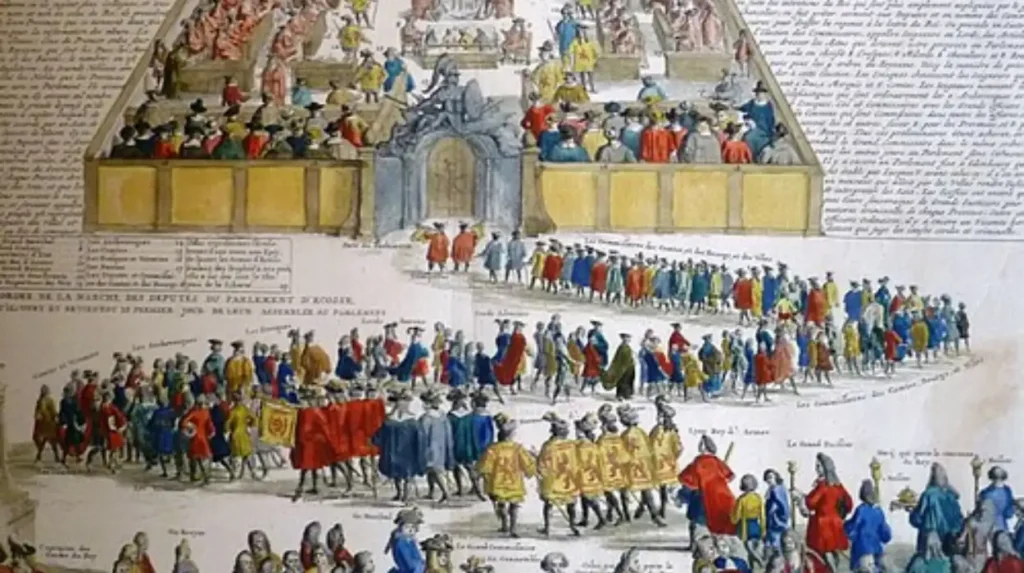The Act of Union of 1707 was one of the major developments in British political history by uniting Scotland and England into one single political entity known as the Kingdom of Great Britain. The act transformed not just the political arrangement but also Scotland’s economy, culture, and identity as a country. To make sense of its complicated influence on the political, social, and economic landscape, we should primarily consider its political effects.
Political Impacts of the Act of Union
There are a number of major political impacts of the Act of Union. The main are described hare:
1. The Immediate Loss of a Separate Parliament
One of the immediate impacts was the end of the Scottish Parliament. From 1707, the only representation Scots had in politics was through an assembly of elected members in the new British Parliament in Westminster. This created resentment amongst Scots, expressed through ideas of political voice being denied to them.
2. Scotland’s Representation at Westminster
In the House of Commons, Scotland acquired 45 seats, while the House of Lords shared 16 seats with Scotland. This measured representation was an effort to represent Scotland in Westminster, which was quite small relative to England. By many critics, particularly those in Scotland, it was argued that Scotland had a little way to account for an influence in most major affirmations of consequence, feeling politically marginalized.
3. The Establishment of the Unified State
The Union politically first brought about a powerful new state being formed at that time. Over a time of governance, this first created conflict around sovereignty, identity, and balance within Britain-some debates right up to the present day.

Financial Effects of the Union
It includes following effects:
Availability of English Markets
Access to England’s colonial and domestic markets was among the main benefits Scotland enjoyed. Scottish merchants could now exchange products without constraint throughout the British Empire. Particularly during the Industrial Revolution, this access set the stage for Scotland’s financial change.
The Termination of Financial Hardship
Scotland was in financial ruin as a result of the unsuccessful Darien Scheme. Under the union, Scotland got a financial settlement called the Equivalent. This money supported its delicate economy and lessened liabilities.
Industrial Expansion and Well-being
Scotland evolved into an industrial center between the 18th and 19th centuries. Industries like shipbuilding, textiles, and engineering thrived. Rising global commerce of Britain and the union helped Edinburgh and Glasgow become economic powerhouses.
Social and Cultural Impacts
Here are following social and cultural impacts, these are:
National Pride and Identity
Though the union presented economic chances, it also raised identity concerns. Many Scots found their cultural legacy eclipsed by English power. This conflict gave rise to efforts to safeguard Scottish culture, literature, and language.
Impact on Education and Enlightenment
The Scottish Enlightenment of the 18th century grew after the union. Philosophically, economically, and scientifically, thinkers such as David Hume and Adam Smith had an impact. Scotland’s universities rose to worldwide fame, thereby demonstrating the subtle support the union offered intellectual growth.
Religion and the Church of Scotland
The Act of Union helped to preserve the Presbyterian Church of Scotland’s autonomy. Unlike in politics, religion was not united under England. This clause prevented broad upheaval and preserved Scotland’s unique religious character.
Rejection and Opposition of the Union
Not everyone welcomed the Act of Union. Many Scots resisted it, claiming it compromised sovereignty. Protests and pamphlets raised worries that Scotland was being assimilated instead of actually brought together.
The Jacobite rebellions of 1715 and 1745 brought attention to discontent with the union. Seeking to reclaim Scottish independence, many Scots backed the Stuart candidates to the throne. Though eventually suppressed, these revolts represented continuous resistance.
The Union’s Role in Shaping Modern Scotland
Scotland is part of the United Kingdom. It made an important contribution to the global British influence. It provided industry, soldiers, and intellectuals to Britain as the country emerged as a world power in the 18th and 19th centuries.
While being part of Britain presented opportunities for economic and political impact, it also presented challenges. Issues of cultural difference and supposed disparities in representation remained a source of tension for Scotland in an integrated Britain.
The Act of Union continues to be debated politically in Scotland. Brexit and the recent calls for independence serve to illustrate how relevant the implications of the union are to today’s political landscape, indicating that an agreement made over 300 years ago is still significant to contemporary politics.
Long-Term Political Developments
Scottish nationalism was brought back into the political mainstream in the 20th century and combined with the growing dissatisfaction with central British rule as movements began to pick up momentum for more autonomy.
1999 marked the entry into force of devolution following the substantial change of re-establishing a parliamentary mode of governance in Scotland;
The upshot of not full independence was that it brought back devolved legislative powers to Scotland in areas like health, education, and justice.
Devolution is said to be the partial unraveling of the 1707 union itself. Such an idea formed a significant aspect of the independence referendum in 2014: whether Scotland’s citizens were going to remain within the union or not.
The representative vote went against independence, but the debate about what it means now with respect to sovereignty continues while that debate also includes the future of the union itself.

The Act: Long-Lasting Legacy of Union
The 1707 Act of Union established the dividing line of Scotland’s political, economic, and cultural topography. New markets, industrial development, expansion of an area for intellectual and cultural flourishing, together with resistance and identity issues and questions on sovereignty, marked the coming of this union.
Over the centuries, it became a basis for Scotland’s contribution to constructing the British Empire and contributed to the development of modern government. However, the ambiguities regarding representation and autonomy never disappeared entirely and helped to inform later demands for devolution and independence. It continues to shape discussions on Scotland’s place in the United Kingdom today.

